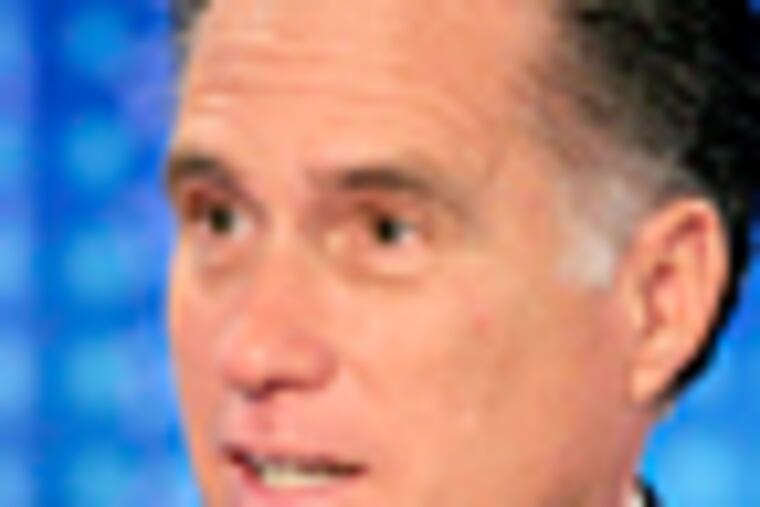A read on the candidates
While book sales aren't the point, such tomes have improved over the years.

This holiday season, America, give someone you love a book - by a candidate for president! All the hopefuls except former Pennsylvania Sen. Rick Santorum (last published: 2006) have a new or fairly new one out.
And a few candidates seem bent on making it pay. Herman Cain - remember him? - had his campaign buy 13,000 copies of This Is Herman Cain! to get the party started. Mitt Romney, as part of his speaking fees, required university libraries to buy his 2010 tome, No Apology, in bulk. Michele Bachmann just kicked off a book tour, seeking to prop up her sagging campaign. Newt Gingrich has been on a nonstop book tour for A Nation Like No Other, published in June, alongside his nonstop campaign.
Absorb the Romney wisdom in No Apology: "The world is a safer place when America is strong." Savor the prose of Rick Perry's Fed Up!: "My biggest motivator for writing this book is to help sustain a national dialogue about the proper structure and balance of government." Thrill to Bachmann, in Core of Conviction, recalling a 1959 Edsel station wagon: "To a little girl all that machinery was impressive, powerful, and shiny." Feel the suspense as Cain asks the big questions: "Just who is Herman Cain? And how did I get this way?" (Cain's italics.)
How did candidates' books get this way?
"All our early presidents - Washington, Adams, Jefferson, Madison - had done extensive writing before their presidencies," says James W. Hilty, history professor at Temple University, "and myths about their lives were built up in the stories their supporters passed along about them."
William Henry Harrison (our shortest-reigning chief exec) was one of the first to collaborate with another writer on a book about himself, James Hall's A Memoir of the Public Services of William Henry Harrison, which came out in 1836, the first time Harrison ran for president.
One of our best prose stylists ever, Abraham Lincoln, "was pushed to write an autobiography, rush-rush, between the nominating convention in Chicago and the election," says Hilty. Abe sent material to John L. Scripps, whose Life of Abraham Lincoln told tales of honesty, humble beginnings, and rail-splitting that became woven into the American fabric.
Do such books have any impact? "Less and less," says Hilty, "especially with the rise of the Web." There are exceptions. John F. Kennedy's Profiles in Courage was much read in the run-up to the 1960 election. "One of the most successful such books," says Mary Ellen Balchunis, assistant professor in mass media and politics at La Salle University, "is The Audacity of Hope and Dreams From My Father by Barack Obama; they were very effective in introducing a previously little-known candidate to the voters."
And that, say both Hilty and Balchunis, is the whole reason for these books. It sure isn't sales (see below). They serve a clear political function: "To bypass the press," as Balchunis puts it, "and talk directly to voters, giving events and policies the spin of your choice." Think of it as a literary calling card. These days, books are part of the grand coordinated multimedia strategy, a seamless garment from TV stints to Twitter tweets.
It's tough: Write a book that stakes a claim, a self, and a platform - but doesn't say anything your opponents can use against you. "The two goals can clash," says Hilty. There's always, therefore, a touch of drama. "That's especially so with Gingrich," says Balchunis: The tireless Georgian has been publishing up a tsunami since leaving office in 1999, "trying to take back the narrative of his life and career."
These books don't sell very well. It can embarrass. George H.W. Bush's Looking Forward of 1987 got swamped by wife Barbara's Millie's Book, "cowritten" with their dog, which ran away and sold 400,000 copies.
As of Dec. 19, Romney's book had sold 1,000 copies this year (although 106,000 since it appeared in 2010). Ron Paul's Liberty Defined was doing pretty well with 40,000. Cain may be out of the race, but his book has done all right, with more than 32,000 sold. Perry's has sold 14,000. For all his efforts, Gingrich's book was maundering around 15,000. Santorum's It Takes a Family has moved 1,000 this year, 14,000 since it appeared, and Bachmann's book has sold 5,000 in its first two weeks and change. (All figures are courtesy of Nielsen BookScan, hardback only.)
Sales aren't really the point, as Edward-Isaac Dovere, deputy political editor at Politico.com, points out. Books "are another chance to get to voters, to get on TV and news shows they couldn't have gotten on before. . . . It's also something tangible to give to voters and donors, something more tangible than just a speech."
Although they aren't Shakespeare, these books read much better than their counterparts of 30 years ago, as candidates and/or their staffs get better and better at communicating their man's or woman's voice; it's actually possible to pick out the Bachmann from the Cain, the Paul from the Perry. Candidates' campaign books: Give the gift that keeps on talking!